Albania offers Mediterranean living without the premium price tag. This guide provides everything you need to know about moving to Albania in 2025.
Quick Facts at a Glance
✓ Visa-free stay: 90 days for UK/EU citizens, 1 year for US citizens
✓ Digital nomad income needed: €817 per month
✓ Retirement visa income: €967 per month
✓ Average internet speed: 250 Mbps (among Europe's fastest)
✓ One-bedroom apartment in Tirana: €400-600 per month
✓ EU pensions: Completely tax-free in Albania*
*Tax information subject to verification - consult a qualified tax adviser
Secure Peace of Mind with Best-Value International Health Coverage
International Citizens Insurance provide free, no-obligation quotes from the leading international health insurance providers with plans tailored to meet your needs. Trusted by thousands of expats worldwide.
Why Consider Albania in 2025?
Albania has transformed into a welcoming destination for retirees and remote workers.
Here's what's new:
Major Improvements This Year
Better Internet
Albania now offers some of Europe's fastest internet speeds. Most cities provide connections of 250 Mbps. This means smooth video calls and reliable connectivity for remote work.
Simpler Visa Process
One online application through the e-Albania portal now replaces multiple office visits. The new system operates in English and typically processes applications within 4-12 weeks.
Tax Benefits for EU Pensioners*
According to recent legislative amendments, EU citizens receiving pensions pay zero tax in Albania. No time limits. No income caps.
*Tax legislation is complex, and individual circumstances vary. Consult a qualified Albanian tax specialist for your specific situation.
EU Membership Progress
Albania continues advancing toward EU membership, with accession talks ongoing since 2020. This brings improved services and stronger property rights protection.
Visa Options Made Simple
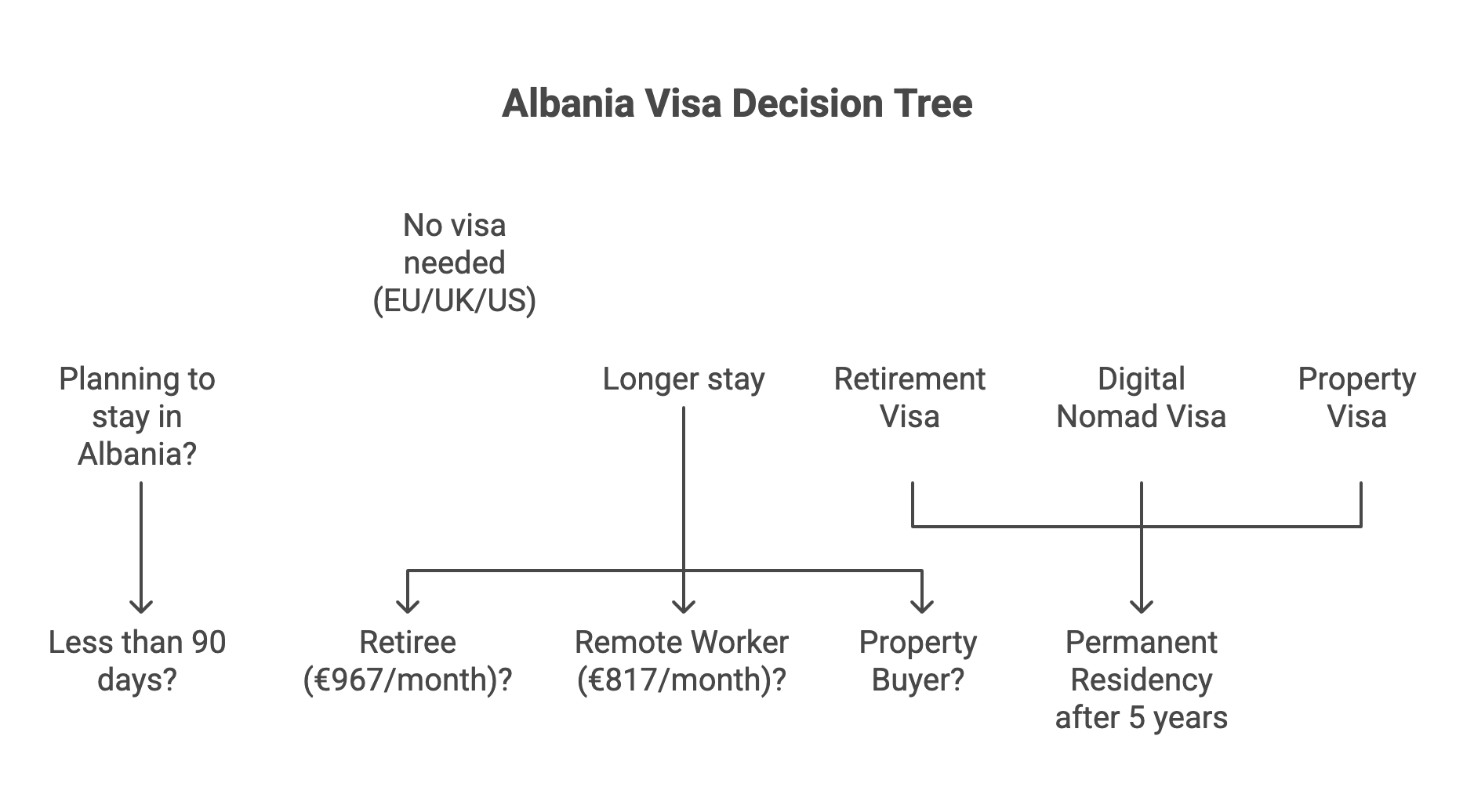
For Short Visits (Up to 90 Days)
UK and EU Citizens: Enter freely, no visa needed
US Citizens: Can stay for one full year without any visa (per US Embassy guidance)
Others: Check the Albanian Ministry of Foreign Affairs for your country's requirements
Important for UK Citizens: When travelling from Albania to Schengen Area countries, you'll need ETIAS approval (€7 fee) starting from mid-2025.
For Longer Stays - Choose Your Path
Option 1: Retirement Visa
Perfect for: Pensioners and early retirees
You need:
- Pension income of €967 per month (€11,604 per year)
- Health insurance valid in Albania
- Notarised rental agreement (minimum 1 year)
- Clean criminal record (apostilled)
- Albanian bank account
Potential benefit: EU pensions may be tax-exempt (verify with tax adviser)
How long it lasts:
- First permit: 1 year
- First renewal: 2 years
- Second renewal: 5 years
- Then: Eligible for permanent residency
Option 2: Digital Nomad Visa (Unique Permit)
Perfect for: Remote workers and freelancers
You need:
- Remote work income of €817 per month minimum (€9,804 annually)
- Proof of remote employment or client contracts
- Health insurance (€30,000 minimum coverage)
- Albanian bank account (required before application)
- Accommodation proof (minimum 20 sqm per person)
Duration: Same as retirement visa (1 year, then 2, then 5)
Application: Submit online via e-visa.al
Option 3: Property Owner Visa
Perfect for: Property investors
You need:
- Property purchase in Albania
- Proof of financial self-sufficiency
- Health insurance
- Minimum 20 square metres per resident
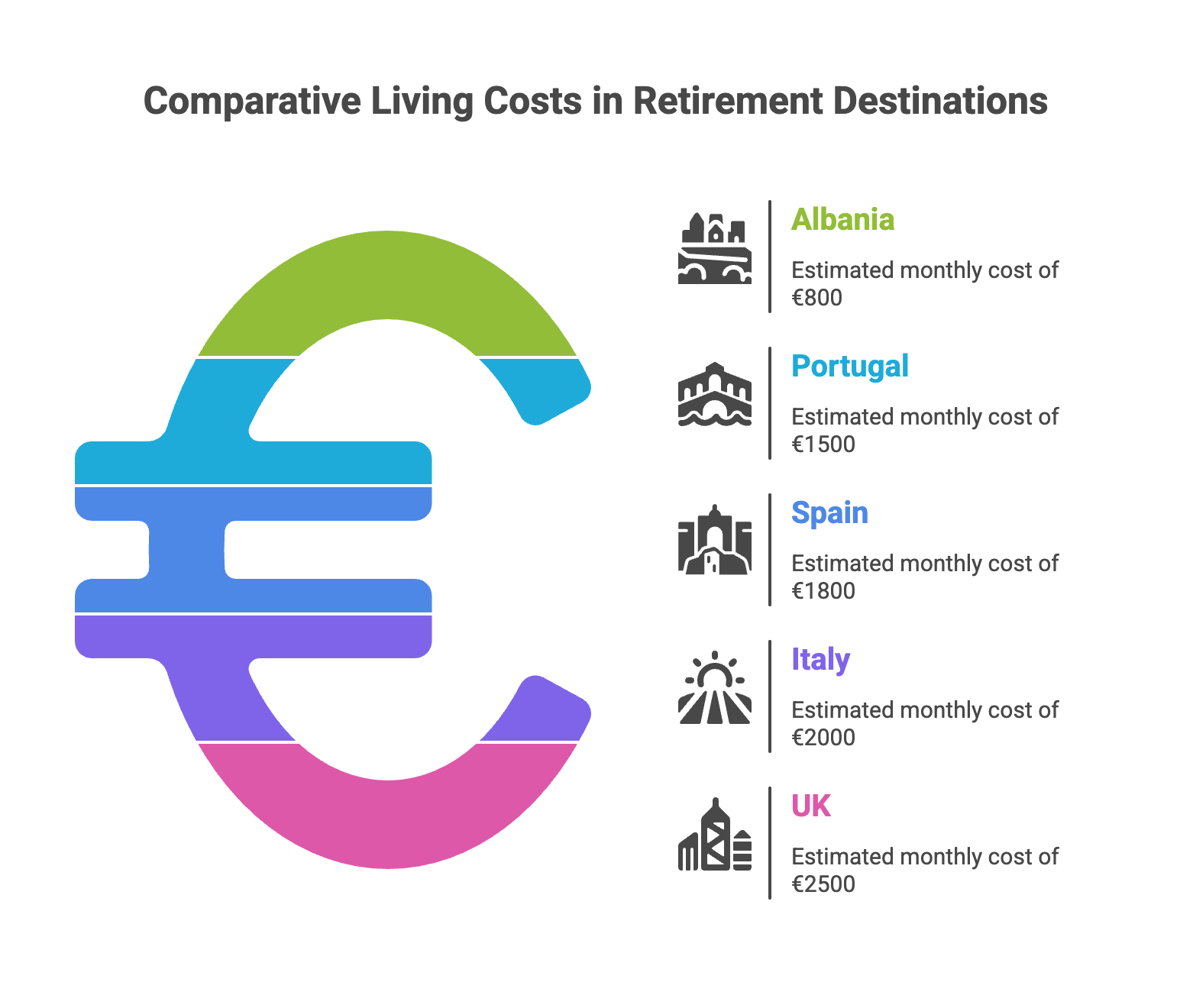
Real Costs of Living in 2025
Monthly Budget Examples
Comfortable Retirement in Coastal Vlora
- Rent (2-bedroom near beach): €350
- Utilities & Internet: €60
- Food & Groceries: €200
- Local Transport: €20
- Healthcare/Insurance: €50
- Entertainment: €120
- TOTAL: €800 per month
City Life in Tirana
- Rent (1-bedroom, nice area): €450
- Utilities & Internet: €80
- Food & Groceries: €250
- Transport: €30
- Dining & Entertainment: €150
- Miscellaneous: €140
- TOTAL: €1,100 per month
City Comparison Table
| City | 1-Bed Apartment | Monthly Living Cost | Best For |
|---|---|---|---|
| Tirana | €400-600 | €1,000-1,200 | City amenities, healthcare |
| Durres | €300-500 | €700-900 | Beach access, near airport |
| Vlora | €250-400 | €650-850 | Year-round coast, value |
| Saranda | €300-400 | €700-900 | Stunning scenery |
| Shkoder | €150-300 | €500-700 | Mountain access, lowest cost |
*Prices as of August 2025. Summer coastal prices may be 20-30% higher.
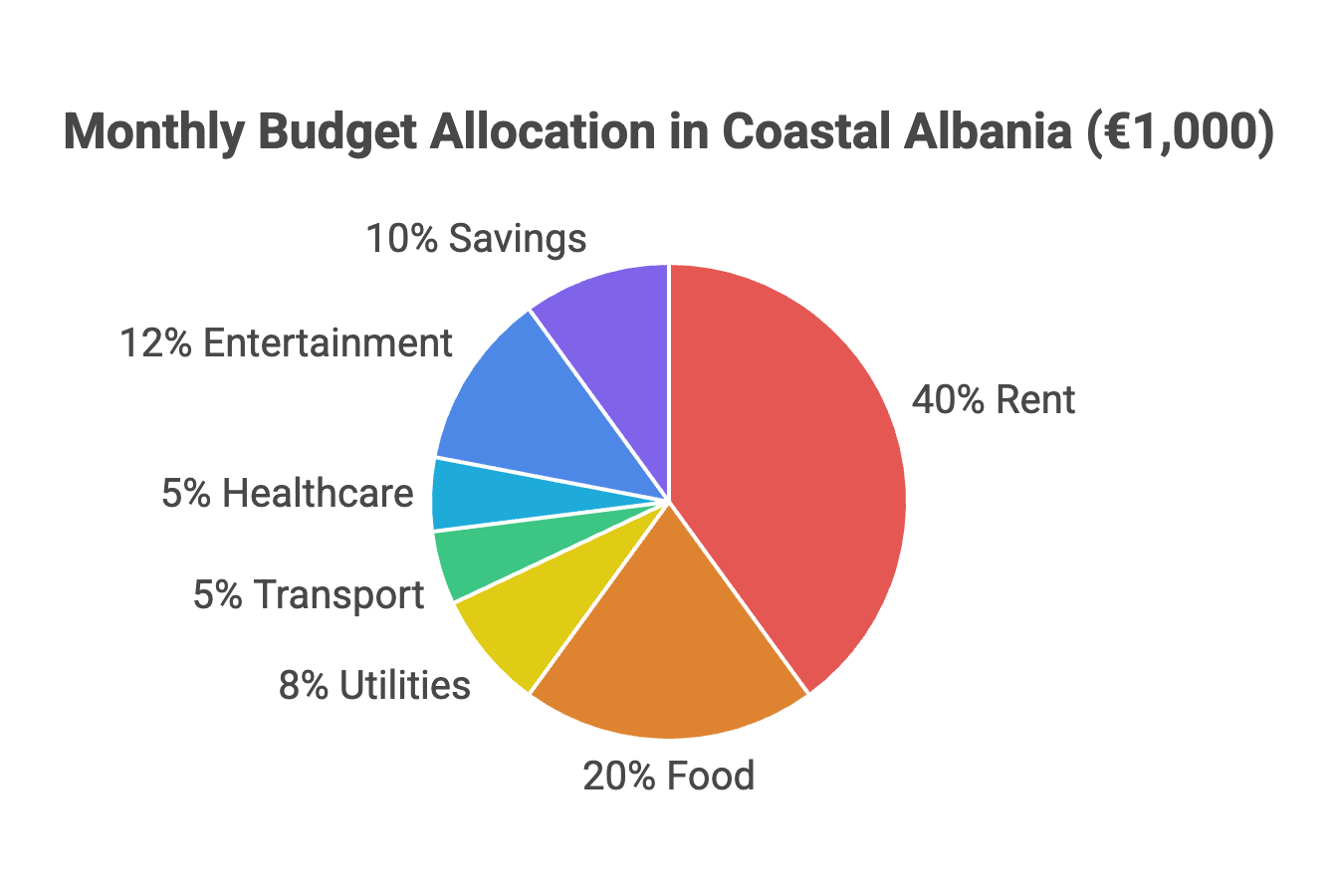
What Things Actually Cost
Daily Expenses (August 2025 prices):
- Coffee at a cafe: €0.60
- Lunch at local restaurant: €5-8
- Dinner for two (mid-range): €25-35
- Loaf of bread: €0.40
- Litre of milk: €1.20
- Local beer: €1.50
- Taxi across Tirana: €5-10
- Monthly gym membership: €25-35
- Petrol per litre: €1.80
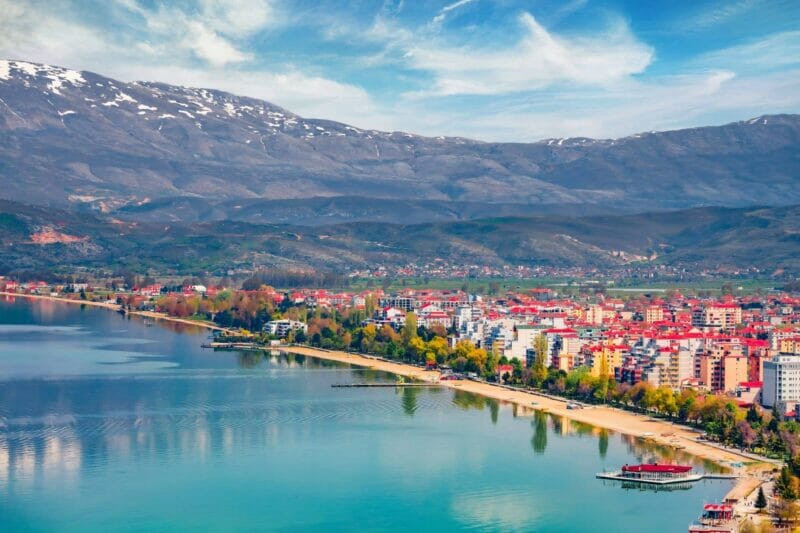
The town of Pogradec and the Ohrid lake.
Healthcare: What You Need to Know
Your Healthcare Options
Public Healthcare
- Available to all residents
- Basic consultation: €20-25
- Emergency treatment: Free
- Quality varies significantly by location
Private Healthcare (Recommended for expats)
- Modern facilities in major cities
- English-speaking doctors common
- Consultation: €30-50
- Comprehensive health screening: €100-150
Healthcare costs are estimates only. Individual needs vary.
Major Hospitals
In Tirana:
- American Hospital - Western standards, English-speaking staff
- Hygeia Hospital - Modern facilities, specialised care
- Mother Teresa University Hospital - Largest public facility, improving standards
Regional Hospitals: Available in Durres, Vlora, and Shkoder with varying quality levels
Insurance Requirements:
- Visa requirement: €30,000 minimum coverage
- International plans: €50-150 per month
- Local private insurance: €30-80 per month
- EU citizens: EHIC/GHIC cards accepted for emergency care
Tax Implications & Benefits
⚠️ Important Tax Disclaimer
Tax legislation is complex, and individual circumstances vary significantly. The information below is general guidance only. Always consult a qualified Albanian tax specialist or international tax adviser for your specific situation before making relocation decisions.
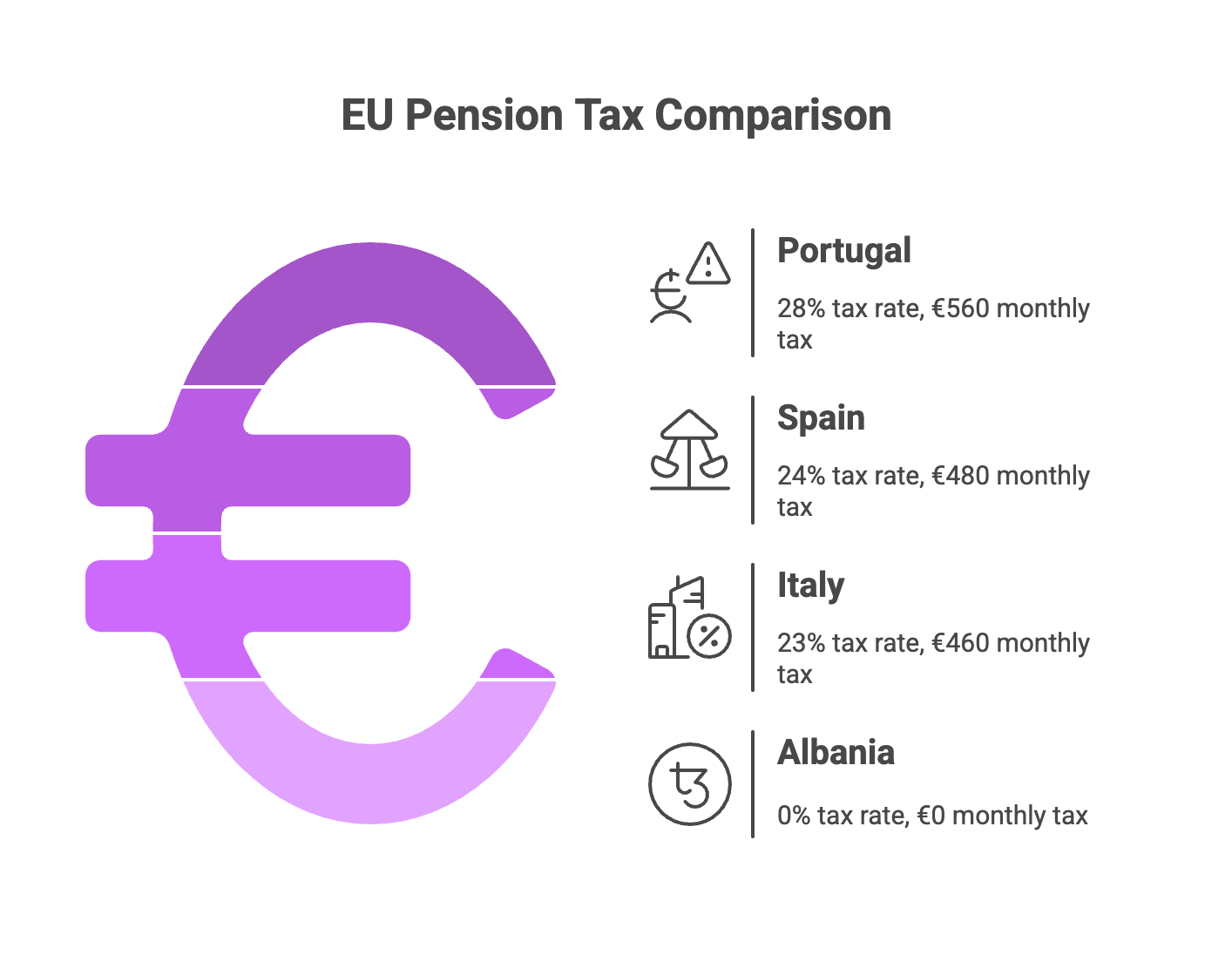
For EU Retirees
According to published reports, EU-sourced pensions may be exempt from Albanian taxation. This potentially includes:
- State pensions from EU countries
- Occupational pensions from EU sources
- Private pension income from EU providers
Verification required: Confirm current tax treatment with a qualified adviser
For UK Retirees
Post-Brexit tax status requires verification
UK pension tax treatment in Albania following Brexit remains unclear. You may face:
- Potential tax of 13% on income up to €21,000
- Potential tax of 23% on income above €21,000
Essential: Consult a tax specialist familiar with UK-Albania tax matters
For US Citizens
Critical Alert: No tax treaty exists between the US and Albania
Implications:
- Possible taxation by both countries
- Foreign Earned Income Exclusion may provide some relief
- State tax obligations may continue
- FBAR and FATCA reporting required for Albanian accounts
Mandatory: Consult a US tax professional before relocating
For Digital Nomads
Tax residency typically begins after 183 days in Albania:
- 15% tax on income up to €1,400/month
- 23% tax on income above €1,400/month
- First €250/month may be tax-free (personal allowance)
Check if your country has a tax treaty with Albania to avoid double taxation.
Where to Live: Choosing Your City
Tirana - The Capital
Population: 500,000+
Pros:
- Best healthcare facilities
- International restaurants and shopping
- Active expat community
- Cultural events year-round
- Best internet infrastructure
Cons:
- Highest living costs
- Traffic congestion and noise
- Construction everywhere
- Summer heat (up to 40°C/104°F)
Perfect if you want: Full city amenities and expat community
Durres - Beach and City Combined
Population: 200,000+
Pros:
- Only 30 minutes from Tirana airport
- Sandy beaches
- Good healthcare options
- Year-round amenities
Cons:
- Very crowded July-August
- Tourist pricing in summer
Perfect if you want: Beach access with urban convenience
Vlora - Best Value Coast
Population: 130,000+
Pros:
- Most affordable coastal city
- Beautiful bay views
- Growing expat community
- Authentic Albanian atmosphere
Cons:
- Limited winter activities
- Fewer English speakers
Perfect if you want: Affordable coastal retirement
Saranda - The Riviera Jewel
Population: 40,000+
Pros:
- Stunning Ionian coastline
- Ferry to Corfu, Greece (30 minutes)
- Warmest winters in Albania
- Crystal-clear waters
Cons:
- Extremely busy in summer
- Limited services October-May
- 4 hours from Tirana
Perfect if you want: Picture-perfect Mediterranean beauty
Shkoder - Mountain Gateway
Population: 135,000+
Pros:
- Lowest cost of living
- Near the Montenegrin border
- Rich history and culture
- Access to the Albanian Alps
Cons:
- No beach access
- Limited expat community
- Fewer modern amenities
Perfect if you want: Mountain lifestyle on a budget
For more information, read our guide on the best places to live in Albania for expats.
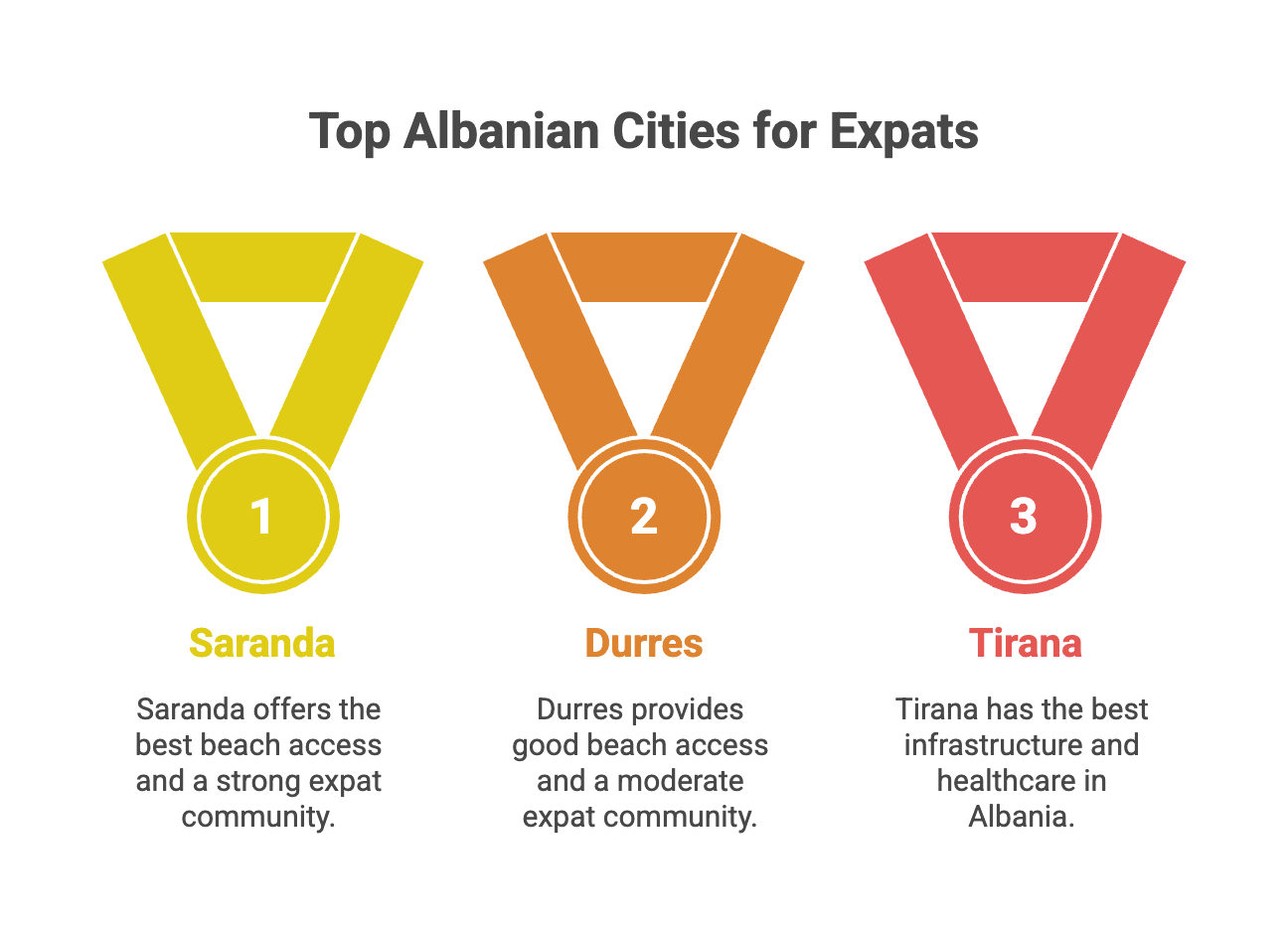
Banking and Money Matters
Opening a Bank Account
Required documents:
- Valid passport
- Notarised rental agreement
- Albanian tax number (NIPT) - obtained from the tax office
- Proof of income (pension statement, employment contract)
- Initial deposit (typically €50-100)
Recommended banks for expats:
- Raiffeisen Bank - Austrian bank, English service
- Intesa Sanpaolo - Italian bank, widely accepted
- BKT (formerly Credins) - Good online banking
Processing time: 1-2 weeks typically
Money Tips
⚠️ Albania remains largely cash-based
Essential knowledge:
- Many businesses don't accept cards
- ATMs dispense both euros and lek
- Always carry cash for: taxis, markets, small restaurants, tips
- Euros accepted but at poor rates (use lek for better prices)
- Bank transfers can be slow (3-5 days international)
Buying Property in Albania
Can Foreigners Buy Property?
Yes - with a few restrictions. Foreigners cannot buy agricultural land exceeding 1,000 sqm without forming a company.
Current Market Prices (August 2025)
Tirana:
- New construction: €1,200-1,400 per m²
- Existing apartments: €800-1,000 per m²
- Suburbs: €600-800 per m²
Coastal Cities:
- Beachfront: €1,000-1,500 per m²
- City centre: €600-900 per m²
- Off-season deals are possible with direct negotiation
Smaller Cities:
- Good neighbourhoods: €400-700 per m²
Total Purchase Costs
Budget these additional costs:
- Notary fees: €150-450
- Registration: €80
- Agent commission: 1-3% (negotiable)
- Legal review: €500-1,000 (essential)
- Property tax: €50-200 annually
⚠️ Critical Property Warnings
Never buy without a lawyer who understands foreign purchases
Common issues include:
- Missing legalisation documents
- Ownership disputes (especially coastal)
- Inheritance complications
- Construction quality problems
- Incomplete infrastructure
Golden rule: Rent first, buy later, after understanding the market
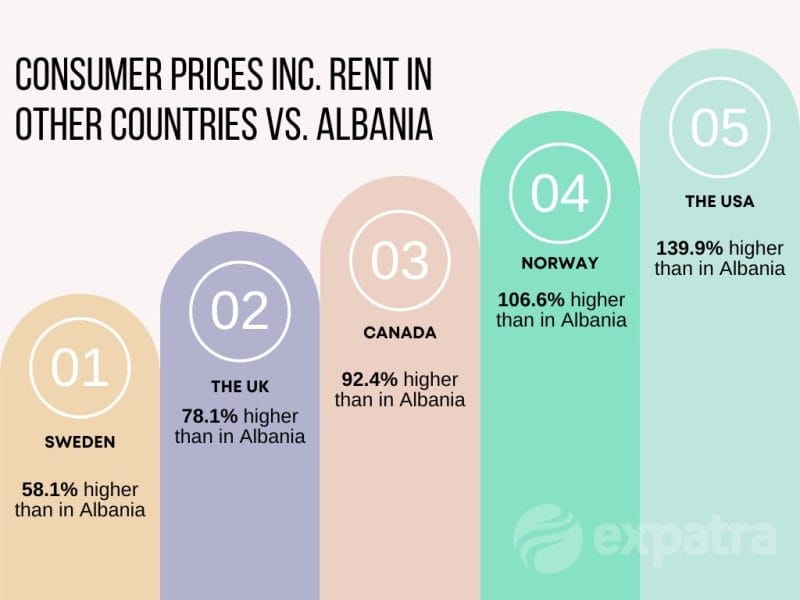
Data Source: Numbeo
Step-by-Step Moving Guide
3 Months Before Moving
✓ Get all documents apostilled in the home country
✓ Arrange comprehensive health insurance
✓ Join Facebook groups: "Expats in Albania", "Tirana Expat Community"
✓ Book initial accommodation (minimum 1 month)
✓ Open a Wise or Revolut account for currency management
✓ Consult a tax adviser about implications
1 Month Before
✓ Book flights (Tuesday/Wednesday often cheaper)
✓ Arrange airport transfer (€25-30 to Tirana)
✓ Notify home country tax authority of move
✓ Download WhatsApp (essential for Albanian communication)
✓ Get a 3-month supply of prescription medications
✓ Scan all important documents to cloud storage
First Week in Albania
✓ Get Albanian SIM card (Vodafone or One - €10-15)
✓ Register with the police if a non-EU/UK citizen
✓ Start apartment hunting (view 5-10 before deciding)
✓ Locate nearest: supermarket, pharmacy, medical clinic
✓ Find English-speaking doctor (ask expat groups)
✓ Get a feel for neighbourhoods
First Month - Critical Tasks
✓ Day 1-7: Secure long-term accommodation
✓ Day 8-14: Obtain NIPT (tax number) from the tax office
✓ Day 15-21: Open Albanian bank account
✓ Before Day 30: Start visa application online (essential!)
✓ Register with your embassy (recommended for emergencies)
After 3 Months
✓ Apply for a biometric residence card
✓ Consider Albanian driving licence exchange
✓ Join local clubs or activities
✓ Explore beyond your city
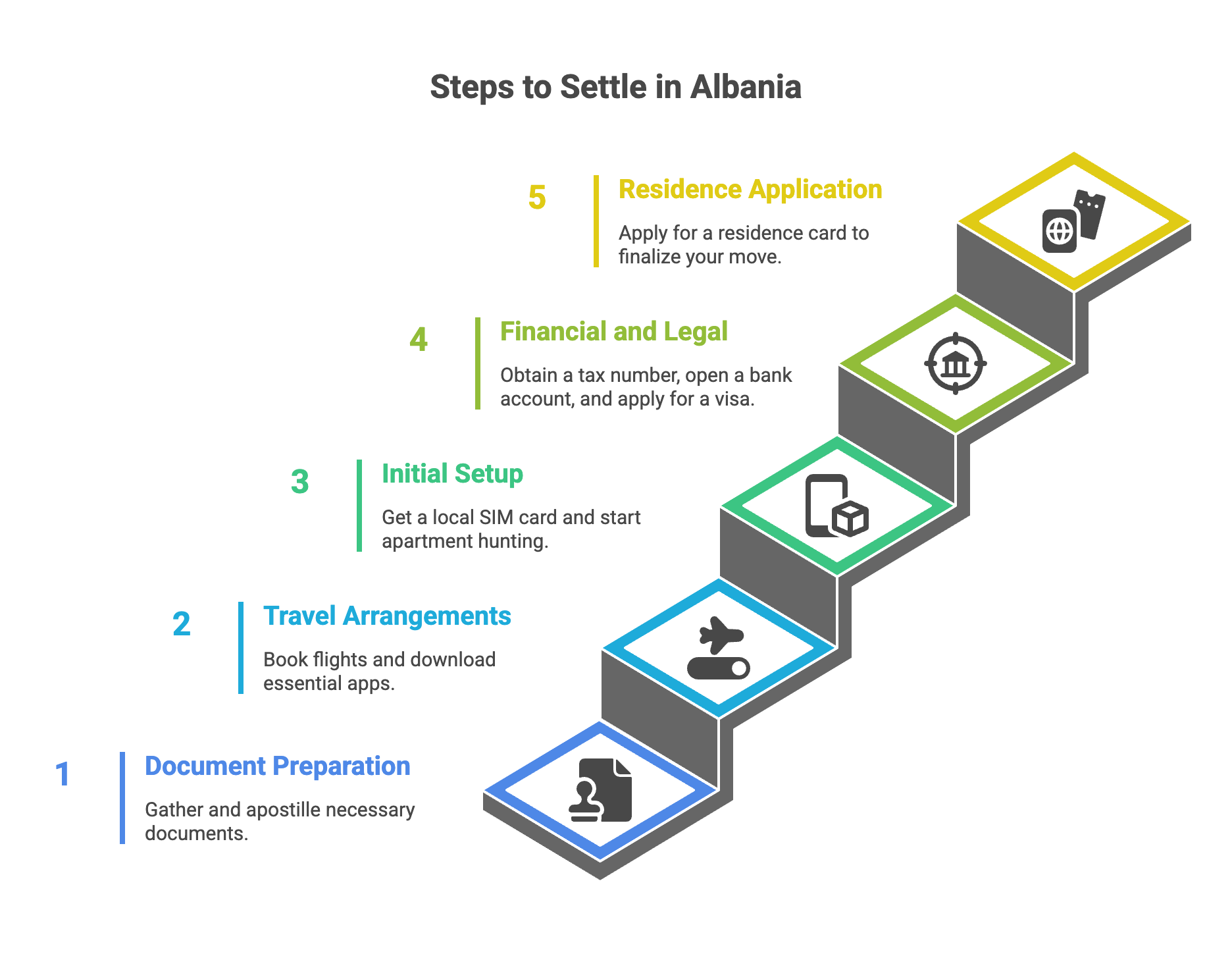
Practical Daily Life
Internet and Phone
Internet Infrastructure (2025):
- Average speed in cities: 250 Mbps
- Fibre optic is widely available
- Rural areas: 20-30 Mbps typically
Home Internet Packages:
- Basic (50 Mbps): €15/month
- Standard (250 Mbps): €25/month
- Premium (1 Gbps): €30/month
- Providers: Digicom, Abissnet, Tring
Mobile Plans:
- SIM card: €5-10
- Monthly plan with 10GB: €10-15
- Unlimited data: €25-30
- Providers: Vodafone, One (Telekom), ALBtelecom
Getting Around
Within Cities:
- City bus: €0.40 per ride
- Monthly bus pass: €15-20
- Taxi start: €2.50 + €0.50-0.70/km
- Bolt app is available in Tirana
- Walking is common and safe in most areas
Between Cities:
- Furgon (shared minibus): €5-15
- Private bus companies: More comfortable, similar price
- Car rental: €25-50/day (book online for better rates)
- Domestic flights: None (country too small)
Shopping and Services
Supermarkets:
- International chains: Conad, Spar, Carrefour
- Local chains: Big Market, Euromax
- Open Monday-Saturday 8am-10pm, Sunday 9am-8pm
Local Markets:
- Every neighbourhood has daily produce markets
- Much cheaper than supermarkets
- Best selection 7am-12pm
Pharmacies:
- Well-stocked, many 24-hour stores in cities
- Many medications are available without a prescription
- Pharmacists often speak Italian or English
Language Basics
English Proficiency:
- Common in: Tirana, tourist areas, among under-35s
- Limited in: Rural areas, the older generation
- Italian is widely understood (due to TV exposure)
Essential Albanian Phrases:
- Hello: "Përshëndetje" (per-shen-DET-yeh)
- Thank you: "Faleminderit" (fah-lem-in-DAIR-it)
- Please: "Ju lutem" (yoo LOO-tem)
- Yes: "Po" / No: "Jo"
- How much?: "Sa kushton?" (sah koosh-TON)
- I don't understand: "Nuk kuptoj" (nook koop-TOY)
- Do you speak English?: "Flisni anglisht?"
Tip: Google Translate app works offline - download Albanian
Safety and Security
Overall Safety Assessment
Albania ranks among Europe's safest countries for foreign residents, with particularly low crime rates against expatriates.
Crime Statistics (relative to expats):
- Violent crime against foreigners: Extremely rare
- Petty theft: Occasional in tourist areas (summer)
- Scams: Minimal, mainly overcharging in tourist zones
- Traffic accidents: Primary safety concern
Specific Advice for Different Groups
For Retirees:
- Albanian culture deeply respects older people
- Assistance is often offered without asking
- Medical alert systems are available in major cities
- Expat buddy systems are common in communities
For Single Women:
- Generally very safe, including evening hours
- Respectful culture toward women
- Normal urban precautions are advised
- Coastal areas are particularly safe
For Families:
- Very child-friendly culture
- Safe neighborhoods and parks
- International schools in Tirana
- Beach areas well-supervised
Emergency Contacts
Emergency Numbers (free from any phone):
- Police: 129
- Ambulance: 127
- Fire: 128
- Tourist Police (English): 04 223 4874

Common Concerns Addressed
"Is the infrastructure really adequate?"
Major cities have modern amenities. Expect occasional power cuts (rare), water pressure issues (summer), and ongoing construction. Rural areas lag significantly behind.
"What about internet reliability for remote work?"
Excellent in cities with fibre optic. Multiple providers ensure redundancy. Mobile data provides backup. Rural areas are less reliable but improving.
"How do I handle medical emergencies?"
Private hospitals in Tirana handle most emergencies well. Keep insurance for complex issues. Medical evacuation insurance is recommended for serious conditions. Many doctors are trained abroad.
"Will I feel isolated without speaking Albanian?"
Expat communities are welcoming and active. WhatsApp groups, coffee meetups, and social clubs abound. Learning basics helps enormously. Young Albanians are eager to practice English.
"Is it really as cheap as people say?"
Yes, but rising. Tourist areas cost more (30-50% premium in summer). Direct deals with locals yield the best prices. Budget 20-30% above online quotes for accuracy.
"What if things don't work out?"
No restrictions on leaving. One-year residence permits don't require staying for a full year. Property can be sold to foreigners. Most expats adapt within 3-6 months.
Recent Changes and Updates (2025)
✅ Improvements Since 2024
- Digital nomad visa process clarified (€817/month confirmed)
- EU pension tax benefits implemented*
- Online visa applications are fully operational in English
- Internet infrastructure expanded nationwide
- New flight routes: London, Berlin, Rome (multiple daily)
- Banking requirements streamlined for visa applicants
📈 Rising Costs to Consider
- Tirana rents increased 20-30% year-on-year
- Coastal summer prices up 15-20%
- Construction activity intensified (noise factor)
- Private healthcare costs rising (still 70% below EU)
- Imported goods are more expensive (weak lek)
🔄 Pending Developments
- ETIAS requirement for UK citizens (expected mid-2025)
- Property transaction digitisation (in progress)
- Expanded tax treaty negotiations
- EU membership progress (ongoing)
*Subject to individual verification
Making Your Decision
Albania is Ideal If You Want:
✓ Mediterranean climate without Mediterranean prices
✓ EU-standard internet for remote working
✓ Potential tax advantages (verify individually)
✓ Safe, respectful environment for retirees
✓ Easy access to Europe (2-hour flights average)
✓ Both mountain and beach lifestyle options
✓ Authentic cultural experiences
Consider Alternatives If You Need:
✗ Perfect infrastructure immediately
✗ Everything in English without effort
✗ Predictable bureaucracy and timelines
✗ Extensive public transport networks
✗ Specialist medical care locally
✗ Corporate career opportunities
Your Next Steps
1. Verify Your Eligibility
Check visa requirements for your specific nationality at Albanian Ministry of Foreign Affairs
2. Calculate Your Budget
Use our city examples, but add 20-30% buffer for unexpected costs
3. Join Online Communities
- "Expats in Albania" (Facebook - 15,000+ members)
- "Tirana Expat Community" (Facebook)
- "Albania Digital Nomads" (Facebook)
4. Plan a Reconnaissance Visit
Best times: April-May or September-October. Minimum: 2 weeks to properly assess
5. Consult Professionals
- Tax adviser (essential for your situation)
- Immigration lawyer (for complex cases)
- Property lawyer (if considering purchase)
6. Prepare Documentation
Start apostille process early (can take 4-6 weeks)
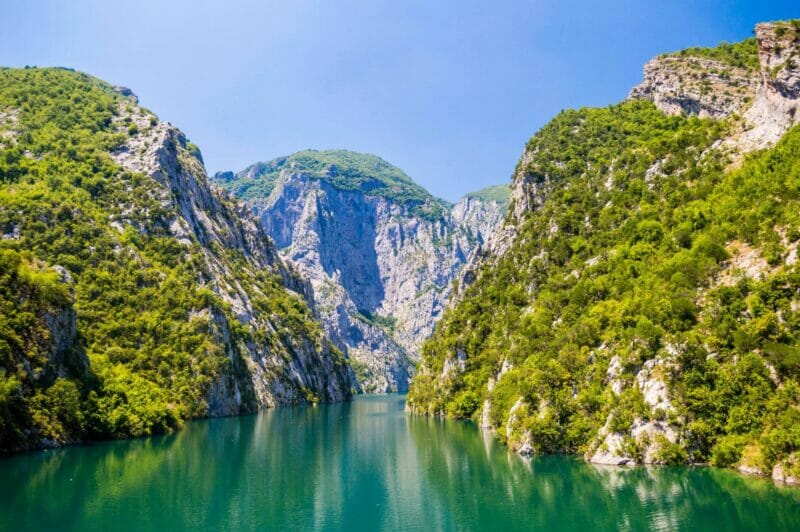
Frequently Asked Questions
Q: How much money do I really need to live comfortably?
A: €800-1,200 monthly provides a comfortable living. Budget higher for Tirana, lower for smaller cities. Add 20% buffer in the first year.
Q: Can I use my UK/EU driving licence?
A: Yes, for the first year. Then, a simple exchange process for the Albanian licence (no test required).
Q: What's the weather actually like year-round?
A: Coastal: Hot summers (25-35°C), mild winters (8-15°C). Inland: More extreme (5-40°C). Rain: November-March mainly.
Q: Is Albanian really that difficult to learn?
A: Yes, it's challenging (unique language family). But not essential - basic phrases suffice. Many expats manage with English/Italian plus gestures.
Q: Can I bring my pet?
A: Yes. Need: pet passport, rabies vaccination (21+ days old), health certificate (10 days before travel). Vets are affordable and caring.
Q: Is the internet good enough for video calls?
A: Excellent in cities. 250 Mbps average means perfect video quality. WhatsApp, Zoom, and Skype all work flawlessly.
Q: Should I rent or buy immediately?
A: Always rent first (minimum 6-12 months). The property market has complexities requiring local knowledge. Buying can wait.
Q: What if I need complex medical treatment?
A: Private insurance is essential. Istanbul (2 hours flight) or Italy (1 hour) for complex procedures. Medical evacuation insurance is recommended.
Q: Are there English-speaking lawyers/accountants?
A: Yes, particularly in Tirana. Costs: Lawyer €50-100/hour, Accountant €30-50/hour. Get recommendations from expat groups.
Q: What about cultural activities and entertainment?
A: Tirana: theatres, concerts, galleries, cinema (original language with subtitles). Smaller cities: limited but growing. Beach/mountain activities are abundant.
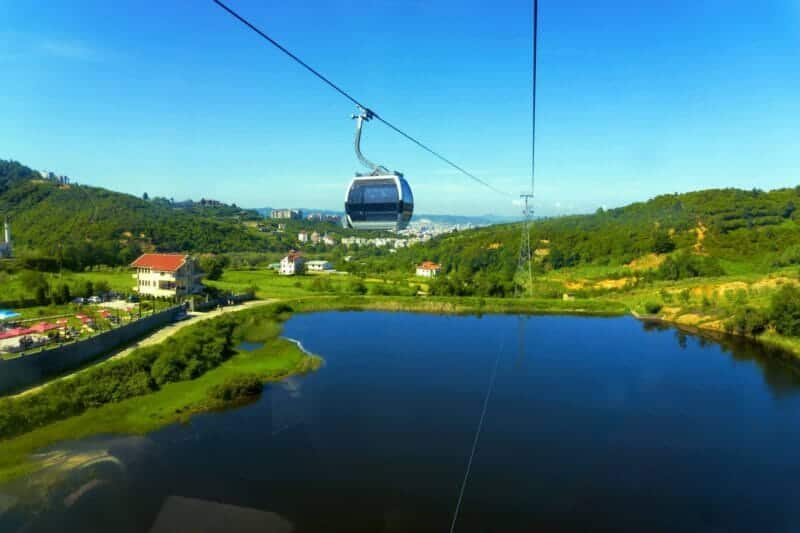
Important Resources
Official Websites
- Albanian e-Government Portal: e-albania.al
- Visa Applications: e-visa.al
- Ministry of Foreign Affairs: punetejashtme.gov.al
Embassy Contacts in Tirana
- UK Embassy: +355 4 223 4973
- US Embassy: +355 4 224 7285
- German Embassy: +355 4 227 4505
- Italian Embassy: +355 4 227 5900
- French Embassy: +355 4 223 4250
Helpful Services
- International SOS (medical emergencies): +355 4 225 1661
- Tirana International Airport: +355 4 238 1800
- Tourist Information: +355 4 222 3313
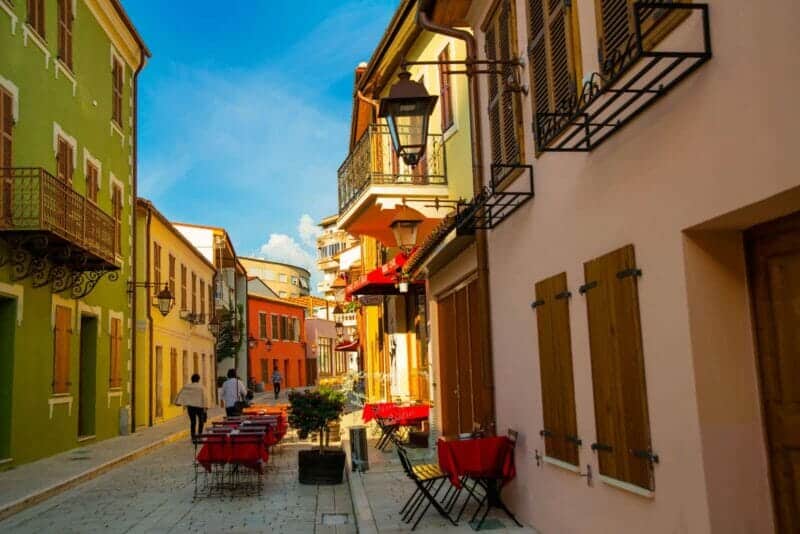
Final Thoughts
Albania in 2025 represents a unique window of opportunity. The country offers an increasingly rare combination: authentic Mediterranean living, improving infrastructure, and genuinely affordable costs.
The transformation from an isolated nation to an EU candidate has accelerated, bringing modern amenities while preserving traditional warmth and hospitality. For those willing to embrace some uncertainty and occasional infrastructure hiccups, the rewards are substantial.
Whether seeking a tax-efficient retirement, a remote work paradise, or simply adventure, Albania delivers authenticity over perfection. The expats who thrive here are those who value genuine connections, natural beauty, and the freedom to live well on modest means.
The regulatory environment continues evolving favourably for foreign residents. Early movers benefit from current pricing and less competition for resources. As EU membership approaches and tourism expands, today's bargains will become tomorrow's memories.
The door is open. The welcome is genuine. The opportunity is now.
But remember: success requires flexibility, patience, and realistic expectations. Albania isn't trying to be Switzerland or France – it's confidently becoming the best version of itself. Those who appreciate this authentic journey find themselves richly rewarded.
Disclaimer
This guide provides general information only and should not be considered legal, tax, medical, or financial advice. Immigration laws, tax regulations, and requirements change frequently and vary by individual circumstances.
Information was compiled from multiple sources believed reliable as of August 2025 but cannot be guaranteed accurate for your specific situation.
Always consult qualified professionals:
- Immigration lawyers for visa and residency matters
- Tax advisers familiar with your home country and Albanian tax law
- Medical professionals for healthcare decisions
- Licensed financial advisers for investment matters
Neither Expatra nor its contributors accept liability for decisions made based on this guide. Your situation is unique and requires personalised professional advice.
Other locations in the Balkans to consider:
You might find useful:
- 5 Cheapest Countries In Europe To Retire To
- Best South American Countries For Expats
- The Best Places To Retire In Europe For Quality Of Life
- 5 European Destinations With Great Weather All Year Round
- The 13 Cheapest Countries To Retire To
Helpful external links:
- Advice for British nationals living in Albania - UK government guidance.
- Albanian traditions and customs - AFS-USA.
- Albania travel update - Travel.State.Gov.
Secure Peace of Mind with Best-Value International Health Coverage
International Citizens Insurance provide free, no-obligation quotes from the leading international health insurance providers with plans tailored to meet your needs. Trusted by thousands of expats worldwide.








